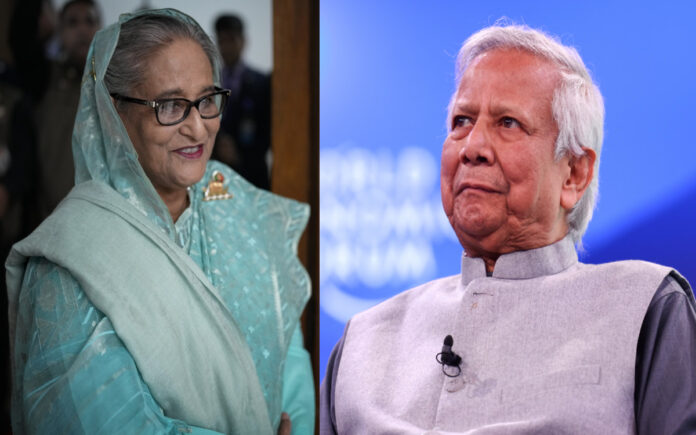Davos, Switzerland: The head of Bangladesh’s interim government, Nobel laureate Muhammad Yunus, declared on Thursday that the country’s high growth during the tenure of ousted Prime Minister Sheikh Hasina was “fake” and criticized the global community for failing to question what he described as Hasina’s corruption.
Yunus, 84, a renowned economist and the 2006 Nobel Peace Prize recipient, assumed leadership of Bangladesh’s interim government in August after Hasina was forced to flee to neighboring India following weeks of violent protests.
Hasina, who served as prime minister for over 15 years, is credited with revitalizing the country’s economy and driving the growth of its massive garment industry. However, her leadership has been marred by allegations of human rights abuses, suppression of free speech, and stifling of dissent. Hasina, who had ruled Bangladesh since 2009, is currently under investigation in her home country for crimes including genocide, murder, corruption, and money laundering. Dhaka has requested New Delhi to extradite her, though the Indian government has yet to respond.
“She was in Davos telling everybody how to run a country. Nobody questioned that,” Yunus told Reuters in an interview during the World Economic Forum’s annual meeting in the Swiss Alpine resort. “That’s not a good world system at all.” He added, “The whole world is responsible for making that happen. So that’s a good lesson for the world,” stressing that Hasina’s claim of Bangladesh’s growth surpassing others was a “fake growth rate, completely.”
Although Yunus did not elaborate on the specifics of why he considered the growth fake, he emphasized the need for broad-based, inclusive growth and reducing wealth inequality. Under Hasina’s leadership, Bangladesh’s annual growth rate surged to nearly 8% in the 2017/18 fiscal year, a significant improvement from about 5% in 2009, before the economic impacts of COVID-19 and the war in Ukraine took a toll.
In 2023, the World Bank recognized Bangladesh as one of the world’s fastest-growing economies, noting the country’s transformation from one of the poorest nations to a lower-middle-income status by 2015.
Tensions in Bangladesh-India Relations
The student-led protests in Bangladesh, sparked by a demand for quotas in government jobs, escalated in July, leading to violent crackdowns that drew global condemnation. Hasina’s government denied using excessive force, but Yunus noted that the protests led to the formation of a student-backed interim government, with Yunus being recommended as the chief adviser tasked with overseeing new elections.
Yunus, who has promised elections by the end of 2025 or early 2026, stated he has no interest in running for office. As the founder of the Grameen Bank, Yunus won the Nobel Prize for his efforts to alleviate poverty through small loans to rural populations who lacked access to traditional banking services.
Also Read | Rivian Plans Hands-Free Driving in 2025, Eyes-Off Technology by 2026
“For me, personally, I’m not very driven by growth rates,” Yunus explained. “I’m driven by the quality of life of the people at the very bottom level. So I would rather bring an economy which avoids the whole idea of wealth concentration.”
Strained Relations with India
The political turmoil has strained Bangladesh’s relationship with India, historically close neighbors with strong trade and cultural ties. Yunus has urged India to return Hasina to Bangladesh to stand trial for the alleged crimes committed during her rule, including against protesters and opposition figures.
Also Read | Historic Winter Storm Freezes US South, Creating Dangerous Conditions
In his remarks, Yunus emphasized the importance of maintaining strong ties between Bangladesh and India, calling the deteriorated relationship “hurtful.” He added, “Bangladesh-India relationship should be the strongest possible. You know, you cannot draw the map of India without drawing the map of Bangladesh,” referring to the two countries’ shared land border.



